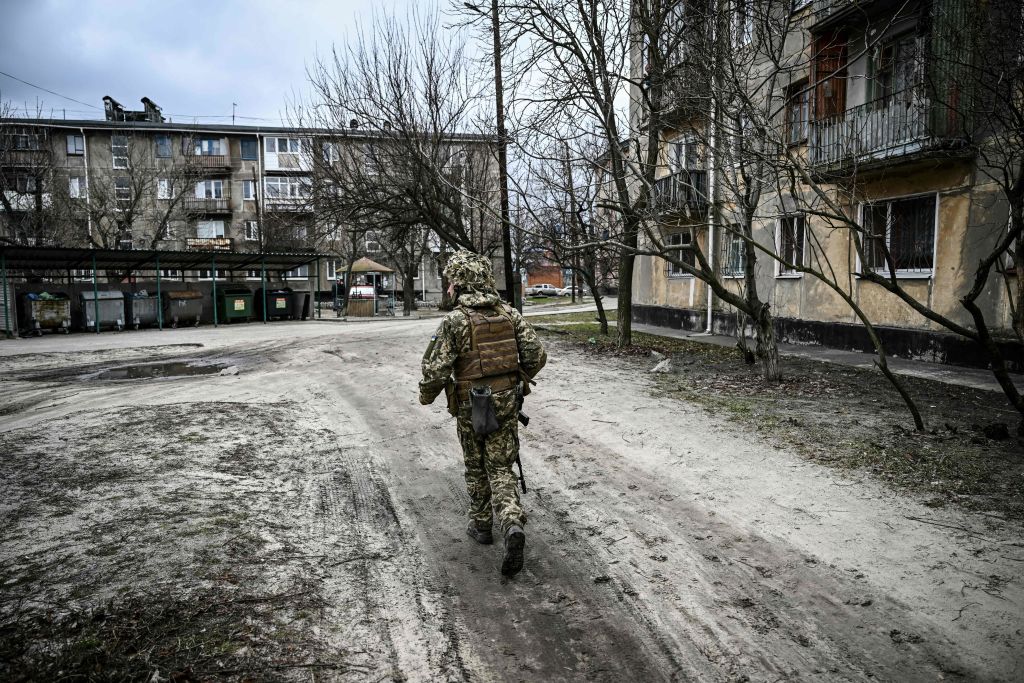At his base near the frontlines outside of Kherson, an ex-British soldier named JK shows me a video of what looks like a scene from the world war one film 1917. It shows him and two other volunteer fighters walking through a burning, smoking treeline, having spent two hours pinned down by artillery and sniper fire that killed three Ukrainian comrades. It was a grim, exhausting day – and, as soldiering experiences go, far more rewarding than life in the British army.
‘When I first signed up for the British army, there was drill and discipline, and if you were punished, your instructor would make you do press ups – that keeps you fit and toughens you up,’ said JK, whose own great-great grandfather won the Victoria Cross in world war one. ‘By the time I left a few years ago, it was like a youth club – the instructors weren’t allowed to be tough any more. If you can’t handle being shouted at, how are you going to handle a battlefield?’
Raised on a London council estate, the 29-year-old is part of a unit of foreign volunteers which was helping Ukraine retake Kherson, the Black Sea port city which the Russians were forced to surrender this week. His unit includes former Paras and French Foreign Legionnaires, ex-cops from the USA, and some who have never fired a gun in anger at all.
For JK, who didn’t get the chance to serve in Afghanistan, the motivation is partly to test his combat skills, and re-embrace a martial culture that Britain no longer seems to value. For every volunteer though, there’s also the romance of following in the footsteps of George Orwell and the International Brigade in Spain – only this time it’s Putin’s fascism rather than Franco’s.
Orwell would recognise aspects of life here. There’s trenches and fox holes, the sound of artillery fire, and bombed-out villages that have changed hands several times. It is sweltering in summer and now bitterly cold. Soldiers doss in abandoned cottages – although for R&R, it’s only an hour and half’s drive to Mykolaiv, which has cafes as nice as any in London. As JK puts it: ‘You can be there and back in the time it takes to watch Saving Private Ryan.’
In other ways, though, this is a very different conflict to the one described in Orwell’s Homage to Catalonia. On the Aragon front, Orwell could often see his fascist enemies in trenches just a few hundred yards away. Here in Ukraine, it is an artillery war, with the two sides lobbing missiles at each other from miles apart. Volunteers who come in expecting close quarters combat with the enemy may never actually see a Russian in their gunsights.
That doesn’t make the war any less deadly. JK’s unit does reconnaissance missions: long, silent treks towards enemy lines, where the trees that separate the fields are often the only cover. Communication is by hand signals: a finger pointed skywards is a drone; a crabbed hand a landmine; the same crabbed hand pointing upwards is a booby-trap.
Already, the frontline here is ingrained in the soldiers’ minds. When JK came back to Britain for a break a while ago, he and his girlfriend went to Center Parcs, only to find that the landscaped woodlands reminded him of Kherson. He found himself scanning the trees for good recon points, and working out the best defensive spot in the bar if Russian troops were suddenly to storm in.
In a gully near JK’s base in Ukraine, troops rehearse storming a Russian-held village – the kind of mission they will repeat time and again as war rumbles on. Even in rehearsal, it’s frightening to watch: a deafening, non-stop hail of gunfire designed to give the troops cover to advance. When the Russians hold their ground, though, a similar hail comes back the other way.
‘This is isn’t Iraq or Afghanistan, where you can work around problems to avoid casualties,’ says JK’s comrade Daniel Burke, an ex-Para from Manchester, who fought with Kurdish YPG forces against Isis in Syria.
‘There are days when a Russian position has to be taken, and where you know you’ll get multiple casualties, because you can only approach through a few treelines that are vulnerable to Russian automatic gunfire.’
These situations often require the kind of grit shown by JK’s great-great grandfather, William Young, who rescued a wounded comrade from German gunfire in 1915 despite being shot twice himself. A street is still named after him in Preston.
Here in Ukraine the newbies train hard in the hope of maintaining similar composure in battle, although Burke says practice is always different from theory.
‘When the rounds start coming in and it all starts going to shit, you remember about 10 per cent of what you’ve learned,’ he says. ‘It’s like your IQ suddenly drops, and you make it up as you go along.’
Ukraine’s military doesn’t publish casualty figures, but the word is that in one such mission to storm a town outside Kherson a few weeks ago, 150 Ukrainian soldiers and more than 600 Russians died. Among the casualties was one of JK’s British comrades, who is currently hospitalised with two punctured lungs and multiple shrapnel wounds.
More very bloody days beckon. The Ukrainian army has recaptured Kherson but vast swathes of the country remain under Russian control. And as the war continues, JK hopes to honour the family tradition started by his VC-winning ancestor. ‘There’s some people in their 20s who are pacifist these days – they think there’s no point in joining the army as all future wars will be nuclear ones,’ he says. ‘But Ukraine has shown that conventional wars are still very much with us.’






Comments